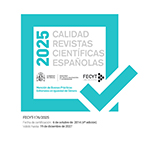Diseño y validación de una escala de autoevaluación de la competencia digital docente y actitud hacia la innovación educativa del profesorado en servicio
Resumen
Introducción. El objetivo de este trabajo es presentar los resultados del proceso de construcción y validación de la Escala de autoevaluación de la competencia digital docente (CDD) y la actitud hacia la innovación educativa del profesorado en servicio. Para ello, se consideran como base las dimensiones y categorías del Marco de Competencias de los Docentes en Materia de TIC (UNESCO, 2019) y el Marco de la Competencia digital docente (INTEF, 2017). Método. La investigación se inscribe dentro de los estudios instrumentales. La población de referencia son profesores de educación media (dos regiones zona norte de Chile). La muestra del pilotaje de la escala la constituyen 200 personas. Para la validación se recurrió a dos procedimientos: validez de contenido por juicio experto (10 expertos internacionales) y validez de constructo: el análisis factorial exploratorio (AFE) y el análisis factorial confirmatorio (AFC). Para establecer la fiabilidad se ha utilizado el coeficiente Alpha de Cronbach. Resultados. La validez de contenido por juicio experto ha permitido depurar y ajustar la escala global inicial a 60 ítems, generando 3 subescalas. El AFE establece 3 factores mayores verificándose la correspondencia con las tres subescalas del cuestionario. El AFC nos indica un buen ajuste del modelo con índices de ajuste incremental (TLI, ILI, CFI) aceptables (.90), al igual que los residuos RMSEA y SRMR (.06). Asimismo, los índices de parsimonia son elevados (superiores .07). La fiabilidad se considera excelente (valores superiores .90), tanto en la total de la escala como en las subescalas estudiadas. Conclusión. La escala de autoevaluación de la competencia digital docente y actitud hacia la innovación educativa, a la luz del proceso de diseño y validación desarrollado, se constituye en un instrumento robusto, fiable y válido para la evaluación de la CDD y la actitud hacia la innovación educativa.
Descargas
Descarga artículo
Licencia
La Revista Complutense de Educación, para fomentar el intercambio global del conocimiento, facilita el acceso sin restricciones a sus contenidos desde el momento de su publicación en la presente edición electrónica, y por eso es una revista de acceso abierto. Los originales publicados en esta revista son propiedad de la Universidad Complutense de Madrid y es obligatorio citar su procedencia en cualquier reproducción total o parcial. Todos los contenidos se distribuyen bajo una licencia de uso y distribución Creative Commons Reconocimiento 4.0 (CC BY 4.0). Esta circunstancia ha de hacerse constar expresamente de esta forma cuando sea necesario. Puede consultar la versión informativa y el texto legal de la licencia.











